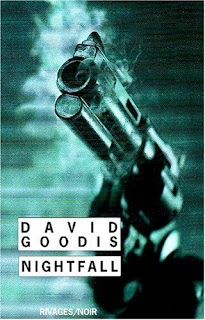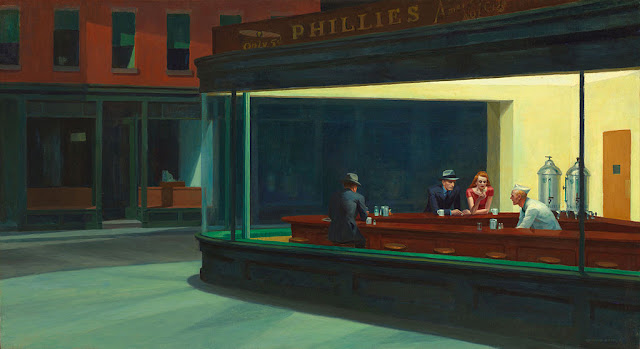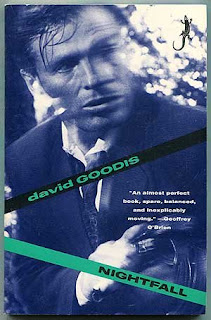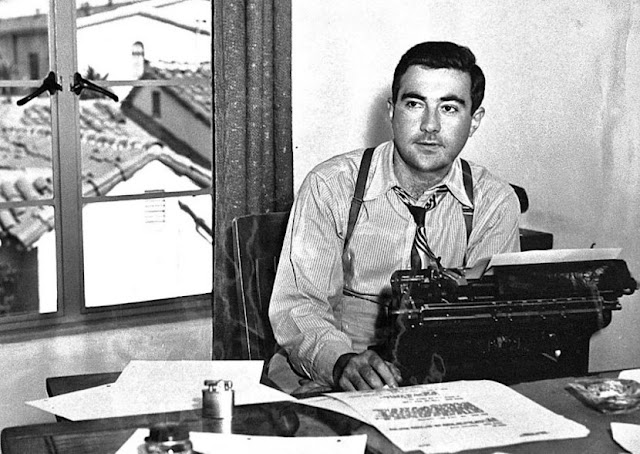Your
name is David Goodis. You’re a guy who lives on luck, whose only
talent is stringing
words together.
Your streak of shitty luck, capped by your wife of two years dumping
you last year, might be turning around. Your second novel will soon
hit the silver screen with Bogie and Bacall. Time to celebrate. Then
again, luck is fickle. You need to bang out another novel. Quick. Why
not another dark one, like the lucky one, another Dark
Passage?
Maybe dark is your metier.
You’re
in a bar. A dark bar. You’re in a booth in a dark corner trying to
come up with an idea for your next
novel while
lady
luck’s still hanging around. There’s a painting on the wall. A
painting of a diner. The diner is well lighted inside but in a dark
part of town. Only three people are inside, plus the man behind the
lunch counter. The three customers seem lost in thought. It feels
like a lonely place. You take out your notebook and write these
words:
The
place was well off Fourth Street, and the weak yellow light from its
window was the only light on the narrow street. Vanning took her in
there and they sat at a small table near the window. They were alone
in the place. It was very small. Their waiter was the proprietor, and
he was a man who looked as if one of his own meals would do him a lot
of good. He was trying to be friendly, but weariness prevented him
from getting it across. He took their order and went away.
You
work out some ideas in your head. Write more words in your notebook.
You finish your gin rickey. You have another and you jot down notes
until you finish the drink. Then you walk back through the hot sticky
night to your lonely apartment. You sit down at your typewriter. You
insert a fresh sheet of paper into the machine. You stare at the
blank page. You look through the notes you made in the bar. You take
a deep
breath, nodding your head a couple of times, and you type:
It
was one of those hot sticky nights that makes Manhattan show its age.
There was something dreary and stagnant in the way all this syrupy
heat refused to budge. It was anything but a night for labor, and
Vanning stood up and walked away from the tilted drawing board. He
brushed past a large metal box of water colors, heard the crash as
the box hit the floor. That seemed to do it. That ended any
inclination he might have had for finishing the job tonight.
Heat came into the room and
settled itself on Vanning. He lit a cigarette. He told himself it was
time for another drink. Walking to the window, he told himself to get
away from the idea of liquor. The heat was stronger than liquor.
He stood there at the window,
looking out upon Greenwich Village, seeing the lights, hearing noises
in the streets. He had a desire to be part of the noise. He wanted to
get some of those lights, wanted to get in on that activity out
there, whatever it was. He wanted to talk to somebody. He wanted to
go out.
He was afraid to go out.
And he realized that. The
realization brought on more fright. He rubbed his hands into his eyes
and wondered what was making this night such a difficult thing. And
suddenly he was telling himself that something was going to happen
tonight...
Your
fingers fly across the keyboard. Ten thousand words a day. You have
the title by the time you type He
didn't even blink when he heard the sirens, although he knew they
were coming toward him and toward no one else. The End
You’re
pleased with
Nightfall.
You know it has flaws. The ending’s not as dark as the other one.
You’re thinking Hollywood now. Hollywood’s not ready yet for as
dark as you want to go. You know Dark
Passage
was a lucky fluke. But Nightfall’s
got the same milieu. That Edward Hopper loneliness. It’s got
suspense and characters and snappy dialogue.
Yeah, the flaws. Dialogue’s
all one voice. Interior and spoken for the two viewpoints. Spoken for
everyone else. You don’t know women very well. You make them either
very very good or horrid. Haha. Like the nursery rhyme. But sometimes
you make them so it’s hard to tell. Like Irene and Martha.
You write roughshod over facts
sometimes. Like with the plot. You know police in three states
wouldn’t care much if Vanning shot a criminal or that he might have
hidden $300,000 from a bank robbery or that they’d compare
fingerprints they found on the gun with fingerprints he gave when he
bought a car. Fingerprinted to buy a car bwaaahahahaha. You laugh at
that shortcut fiction because you know your heart-grabbing characters
and breathless suspense and the desperate surreal mood you’ve
created will carry your thrill-junky readers as far as you wish to
take them. Farther than the Lone Ranger and Dingus Magee and
Bogie/Bacall and the Fat Man all in one crazy wild-ass bunch and you
know it.
And
even tho you have a j-school degree and know damned well no newspaper
reporter would dream of calling the Denver PD from New York from a
pay phone to find out everything the police in two states know about
a nearly year-old homicide and missing three-hundred grand the
Seattle bank’s already recovered from its insurance company and get
the Denver police to call the Seattle police while you’re waiting
in the phone booth and for Denver to relay Seattle’s information
back and...hello? Hello...clickclickclick...But
you shrug and laugh and make Vanning impersonate a reporter and
his editor and get the information this way because your flying
fingers and ten-thousand-word daily self-imposed deadline and the
story’s furious pace and Hollywood’s insatiable maw and Bogie and
Bacall simply won’t allow you to do it the long way.
You
pause for part of a second to field a notion that maybe there’s a
chance for a spinoff series starring Vanning as the greatest news
reporter who ever lived who wins so many Pulitzers he gets bored and
drinks himself to death and...But back to Nightfall.
Stop with the damned distractions!
And
you write paragraphs like this and holy shit you’ll have your
readers drooling on the page:
...he saw himself in a mirror,
this time the mirror behind the bar, and he saw in his own eyes the
expression of a man without a friend. He felt just a bit sorry for
himself. At thirty-three a man ought to have a wife and two or three
children. A man ought to have a home. A man shouldn't be standing
here alone in a place without meaning, without purpose. There ought
to be some really good reason for waking up in the morning. There
ought to be some impetus. There ought to be something.
Postscript:
You die a couple of days following a bar fight nineteen years after
publishing Nightfall.
You were 49. You’d written 14 more novels, many of them inspiring
movies (most of them in France) or TV segments. The film
adaptation of Nightfall
was released in 1956, nine years after the book, and without Bogie or
Bacall. Your books go out of print but have rebounded and are bigger
than ever, riding a revival wave of noir. You’ve become a genre
classic. That’s something.
[For
more Friday's Forgotten Books check the links on Patti
Abbott's unforgettable blog]




I've read six of David Goodis's novels. You could almost predict that fatal bar fight from reading his novels.
ReplyDeleteAccording to Wiki he was "doing research" for his writing. Thanks for the visit, George.
DeleteI am looking forward to reading this one. I enjoyed your review although I skipped a couple of paragraphs since I haven't read it yet.
ReplyDeleteHa. Done't worry, no spoilers!
DeleteThanks, Matt, for making me aware of the film version of "Nightfall," which is available on YouTube and which I'll definitely watch.
ReplyDeleteI'm a fan of Goodis' work, as evidenced by my reviews of DARK PASSAGE (https://kevintipplescorner.blogspot.com/2017/06/ffb-review-dark-passage-1946-by-david.html), CASSIDY'S GIRL (https://kevintipplescorner.blogspot.com/2011/12/fridays-forgotten-books-cassidys-girl.html), and NIGHT SQUAD (https://kevintipplescorner.blogspot.com/2014/06/ffb-review-night-squad-by-david-goodis.html).
I enjoyed your Dark Passage review on Kevin's blog, Barry.
Delete